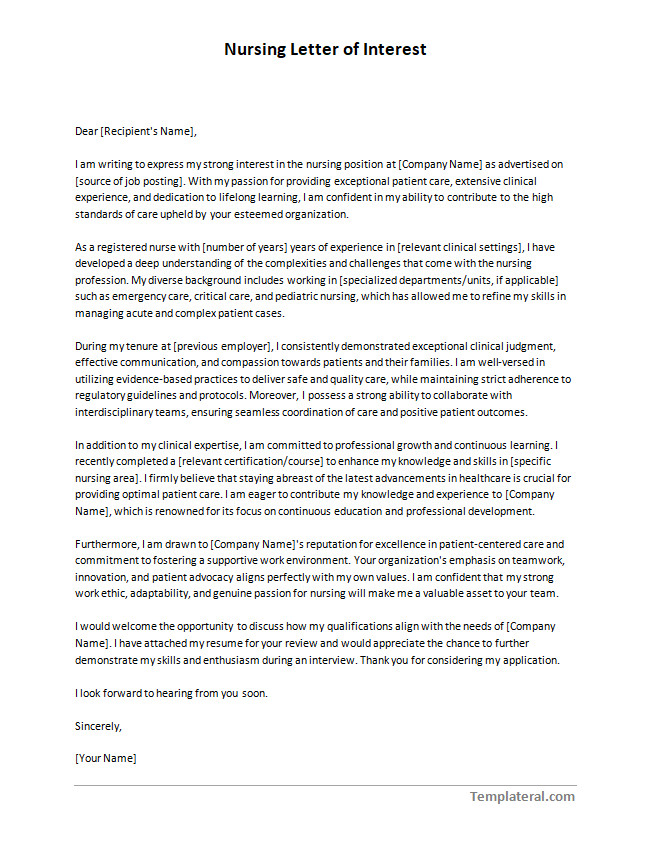
When pursuing a career in nursing, it is essential to showcase your interest and dedication to potential employers or nursing schools. One effective way to do this is by writing a nursing letter of interest. This document allows you to express your passion for the field, highlight your qualifications, and demonstrate your commitment to providing quality patient care. In this article, we will explore what a nursing letter of interest is, why you need one, what to include, how to write it, and the common mistakes to avoid.
What is a Nursing Letter of Interest?
A nursing letter of interest, also known as a letter of intent or statement of purpose, is a formal document that introduces you to potential employers or nursing schools. It serves as an opportunity to express your interest in a specific nursing position or program and to explain why you are an ideal candidate.
This letter allows you to go beyond the information provided in your resume or application and provide a more personal and compelling narrative. It should convey your passion for nursing, your relevant experiences and skills, and your future goals in the nursing field.
Why Do You Need a Nursing Letter of Interest?
A nursing letter of interest is a crucial component of your application package, whether you are applying for a nursing job or admission to a nursing school. Here are a few reasons why you need one:
- Highlight your qualifications: A well-written letter of interest lets you showcase your skills, experiences, and achievements that make you a strong candidate for the position or program.
- Express your passion for nursing: The letter provides an opportunity to convey your genuine interest in the field and your commitment to providing quality patient care.
- Stand out from the competition: A compelling letter can set you apart from other applicants and make a positive impression on potential employers or admissions committees.
- Personalize your application: The letter allows you to personalize your application and demonstrate why you are a good fit for the specific nursing position or program.
What to Include in a Nursing Letter of Interest
When writing a nursing letter of interest, there are several key elements that you should include to make it effective:
- Your contact information: Start the letter with your full name, address, phone number, and email address.
- Greeting: Address the letter to the appropriate person using their name and professional title.
- Introduction: Begin the letter with a brief introduction that states your purpose and expresses your interest in the nursing position or program.
- Your qualifications: Highlight your relevant skills, experiences, and achievements that make you a strong candidate. Provide specific examples and quantify your accomplishments when possible.
- Your passion for nursing: Share your personal story and explain why you are passionate about nursing. Discuss any experiences or encounters that have shaped your desire to pursue a career in nursing.
- Your future goals: Clearly state your career goals in the nursing field and how the position or program aligns with your aspirations.
- Closing: End the letter by expressing your gratitude for the opportunity to apply and your enthusiasm for further discussions or consideration.
- Contact information: Provide your contact information again at the end of the letter for easy reference.
How to Write a Nursing Letter of Interest
Writing a nursing letter of interest may seem intimidating, but you can create a compelling document with the right approach. Here are some tips to help you get started:
- Research the organization or school: Before writing your letter, research the organization or school to understand its values, mission, and specific requirements. This will allow you to tailor your letter to their needs and demonstrate your knowledge and interest.
- Be clear and concise: Keep your letter focused and avoid rambling. Use clear and concise language to convey your message effectively.
- Showcase your achievements: Highlight your relevant achievements, experiences, and skills that make you a strong candidate. Use specific examples and quantify your accomplishments when possible.
- Use a professional tone: Write in a formal and professional tone throughout the letter. Avoid using slang or informal language.
- Proofread and edit: Before submitting your letter, carefully proofread it for any grammatical or spelling errors. Edit it for clarity and coherence, ensuring that the content flows smoothly.
Mistakes to Avoid
While writing a nursing letter of interest, there are some common mistakes that you should avoid:
- Generic content: Avoid using generic statements or clichés. Instead, make your letter specific and personal to stand out from other applicants.
- Grammatical and spelling errors: Carefully proofread your letter to ensure it is free from grammatical or spelling errors. These mistakes can create a negative impression and undermine your credibility.
- Exaggeration or dishonesty: Be honest and truthful in your letter. Avoid exaggerating your experiences or qualifications as it can be easily detected and may harm your chances.
- Neglecting to address specific requirements: Tailor your letter to the specific requirements and needs of the organization or school. Failing to do so may give the impression that you did not put enough effort into your application.
- Not proofreading: Always proofread your letter before submitting it. This will help you catch any errors or inconsistencies and ensure that your letter is polished and professional.
By following these guidelines and avoiding common mistakes, you can create a compelling nursing letter of interest that effectively showcases your passion for the field and your qualifications. Remember to personalize your letter, be genuine, and highlight your unique strengths and experiences. A well-written letter can significantly enhance your chances of securing a nursing position or admission to a nursing program.
Download: Nursing Letter of Interest Template